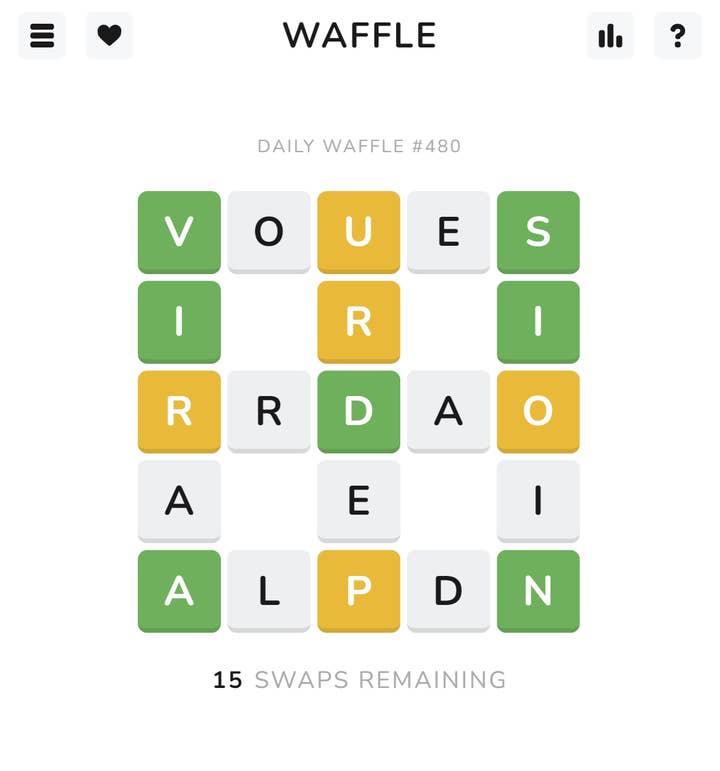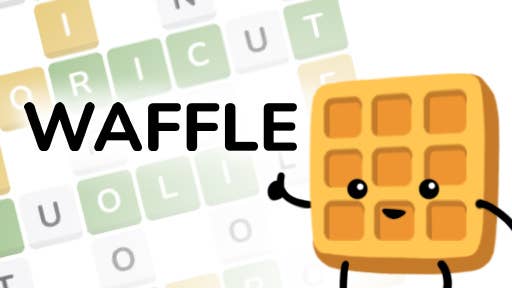'I've turned down life-changing money': The story of Waffle
The creator of the hit word game explains why he wants to keep it independent
Sign up for the GI Daily here to get the biggest news straight to your inbox
When I was asked if I'd like to speak to James Robinson, the creator of Wordle-like browser game Waffle, I wasn't especially enthusiastic.
After Wordle took the world by storm, there was a rush of similar games: Quordle, Factle, Heardle… Waffle was simply another one of those. The hook I was given is that Robinson – a solo developer based in Portsmouth, UK – had struck a deal with Amazon that gives Prime subscribers an exclusive daily Waffle game. That's certainly a little more interesting, but I still wasn't convinced.
But then, facing a delayed train, I decided to check the game out. After two hours, I'd played nearly 100 games. I told my wife, a fellow Wordle aficionado, about it, but it turned out she'd already exhausted the entire Waffle archive.

Waffle is a game where players must rearrange letters to find six five letter words, all presented in a grid that looks a little like a waffle. You have 15 turns to try and complete it. The key difference is that, unlike Wordle, there's little fortune involved. This is a game where high scores are achieved by skill, rather than luck.
"I was just doing the washing up, and I was thinking how Wordle could be transposed into something with a different dimension to it," Robinson tells us. "With Wordle, if you want to get the top score you have to be kind-of lucky, which isn't my sort of game.
"I quickly tried to see if I could make something in a four-by-four grid, but that was too difficult. So I came up with a five-by-five grid, only with some gaps in it so it's a bit easier to create. I then showed it to my wife who said: 'That looks a bit like a waffle.' I thought that sounded like a good name.
"I did it on paper first and shared it with friends to see if they could solve it. I tested it that way. It took about two weekends of quite intently trying to get it to work. I just wanted to create the simplest possible game and get it on the internet."
"Waffle took about two weekends of quite intently trying to get it to work"
Robinson had always wanted to be a games developer. His dad taught him how to make games on the Commodore 64, and he even created a simple dodging game on a Psion handheld at school.
"You just had to move up and down, but people loved it," he recalls. "I didn't see my Psion for the rest of the day. It just got passed around."
Robinson's programming career took him into web development, but he always dreamed of making games. He'd jot down ideas and had a New Year's Resolution every year that he would make a game, but he never did.
"I would always get so far, but then not complete it. I thought you'd need to learn Unity or something to create one."
He continued: "I have had loads of ideas and I would write them down in notebooks. I just kept trying to come up with different mechanics. I was inspired by [Wordle creator] Josh Wardle. I heard a podcast where he said he just got it together as quickly as possible; he didn't try to perfect it, he just got it out there. And that inspired me to do the same."
Waffle's daily game is largely automated, although Robinson and his wife do spend their evenings coming up with amusing descriptions for the words that appear in each game.
"That is a rod for our own backs now," he admits. "We have to spend every evening trying to think of some nonsense for whatever word we've got coming up. What funny thing can we say about the word 'drain'?
"We have had people say they love playing it for the word descriptions… which means we have to keep on doing it. If people hadn't mentioned it for a while, we would have stopped. But who knows what that would do to our numbers if we stopped doing it? And I wouldn't outsource it. It is us. It's our personality."

As well as the daily Waffle, there is also a much larger (and harder) weekly 'Waffle Deluxe', which is for more seasoned players.
But how did the game go from two weekends worth of work to attracting the attention of Amazon?
"I shared it on Reddit and got some views and people playing it. And I shared with groups on Twitter who were talking about Wordle and other daily word games," Robinson answers.
"But then it got featured on PCGamer.com as one of the top alternatives to Wordle, which bumped the numbers to a new high. Then it got featured on CNET, which bumped it to another new high. Then Lifehacker… it just had this organic spread. And each time it would bump up to this new level and then stay there, which it has done consistently over the last year.
"We get these waves now of it bumping up, and we don't know what causes it. It just gets mentioned on podcasts or Twitch streams. If you search the word 'Waffle' now, we are the No.1 result on Google search in the US and UK. And that's from no effort on my part. My cousin asked me about SEO advice, but I can't give him any. I didn't do anything to get it up there.
"It shows to me that the internet works. As an amateur, you can put something on the internet and if enough people are interested in it, it can get up there."
"If you search the word 'Waffle' now, we are the No.1 result on Google search in the US and UK"
The game broke 400,000 daily players over a year ago, and it's still hitting around 450,000 players today.
"It's not really gone down," Robinson says. "I've heard from some of the other games that there's been these spikes of interest, and then it drops… but mine has been consistent. It was 455,000 yesterday."
Then Amazon came calling. The firm contacted Robinson through his Twitter account, and said it wanted to find a way to incorporate daily word games into its Prime subscription service. This led him to create an exclusive 'third' Waffle game – Waffle Royale – which is exclusive to Prime users in the US and Canada.
"Waffle Royale is mid-way between the daily one and the deluxe one in terms of difficulty," Robinson says. "It's a diamond shape. We are talking about potentially pushing that out globally at some point."
The Amazon partnership is one of several ways that Robinson has looked to monetise Waffle. It currently accepts donations from users, which enables players to play without ads, and unlock the archive of Deluxe games. But the biggest revenue generator has come via advertising.
Going forward, Robinson is looking into merchandise based on the game's characters. But the next stage for Waffle is the creation of a standalone app, which is being created by Lively, a Leamington Spa-based studio owned by Keywords.
"The app will be more substantial and it's going really well," Robinson says. "We are speaking to publishers and we've had some interest. That's taking up a lot of time at the moment, and we're excited about that."
All of this business development comes after Robinson turned down offers to buy Waffle outright.
"I have had a lot of offers," Robinson reveals. "I was working for another company at the time of these offers, so I had to make a decision. One of them was a life changing amount of money. I could have done that and finished it there. But I have always wanted to make more games, and if I was to sell it, I wouldn't have that platform to make more. It's a decision I still think about every day. But… we are keeping it independent.
"I just want to make more games. I've still got my notebooks full of ideas that I've had for years. Now I've got this audience to test the out with, and I think that's a massive thing.
"Also… I enjoy it. I am making money from it. I've quit my job. It's fun. What else would I do? This way I can try and get into the games industry."
I'd argue that Robinson is very much already in the games industry.
"I still feel like an imposter," he concludes. "I made a very simple game. But I'm learning about the industry.
"I am already working on other ideas. They're all small. I like getting to the heart of what makes a small, fun game. And I have some ideas that I'd like to create as quickly as possible."
Sign up for the GI Daily here to get the biggest news straight to your inbox








.jpg?width=291&height=164&fit=crop&quality=80&format=jpg&auto=webp)
